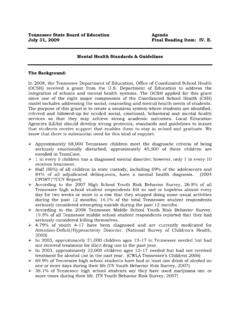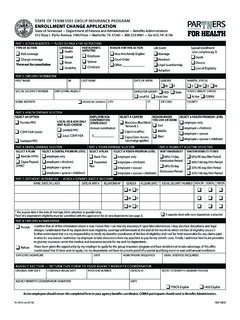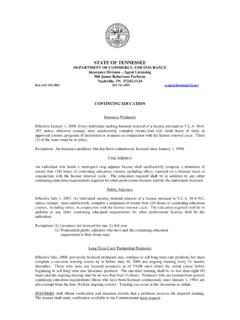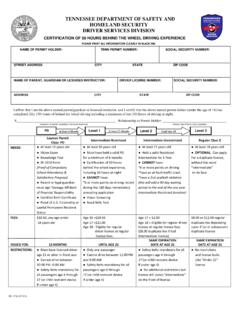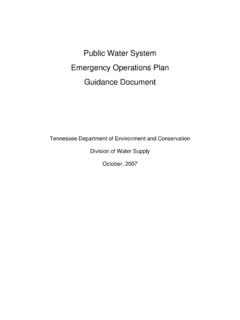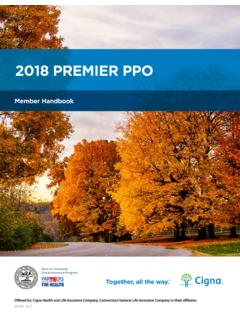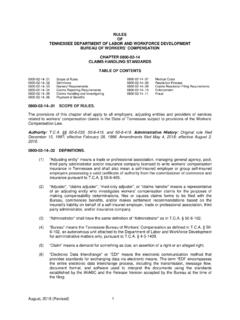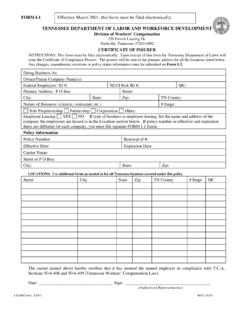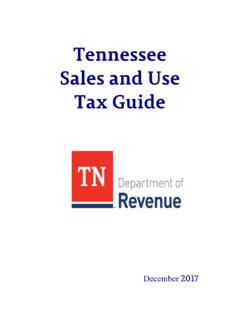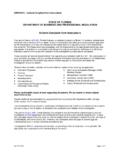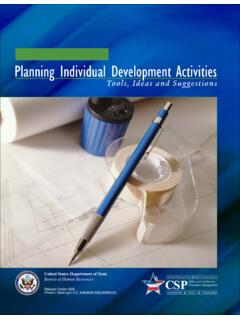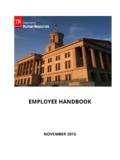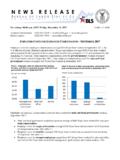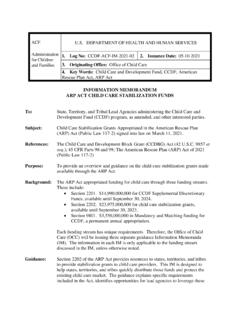Transcription of ii - Tennessee State Government - TN.gov
1 Introduction Attendance and Leave Introduction ..1 Hours of Work .12. Management's Role .. 2 Absenteeism . 12. Successful Onboarding ..3 Lunch Hour ..12. The employee 's Role .. 3 Rest Breaks 12. Wellness Break 13. Compensation Holidays ..13. Leave Accrual .14. Pay Periods .. 4 Annual Leave ..15. Direct Deposit .. 4 Sick Leave .. 15. Paternal Leave 16. Overtime ..5 Family Leave 18. Compensatory Time .. 5 Adoptive Leave ..19. Prior Service .. 6 FMLA .19. Civil Leave ..19. employee Benefits Military Leave ..19. Bereavement Leave 20. Insurance .7. Discretionary Leave 20. Deferred Compensation 7. Special Leave ..20. Sick Leave Bank 8. Elections .20. Donated Leave .9. Inclement Weather .21. Service Awards .9. Disaster Leave 21. employee Suggestion Award Program ..10. Tennessee Employees Charitable Campaign ..10. Learning and Development ..10. Parking .10. Fee Waiver/Fee Discounts.
2 11. ii General Personnel Practices Separations ..22. Performance Management .23 Resignation .37. Probationary Periods ..24 Dismissal ..37. Promotions/Transfers ..24 Job Abandonment .37. Conflict of Interest ..25 Return of State Property ..37. Political Activity ..26. Personnel Records 26 employee Awareness Statement employee Identification ..27. Equipment& Supplies . 27. Telephone Use 27. Computer Use ..27. Solicitation ..28. Gifts .28. Personal Property .28. Dress Code ..28. Health and Safety Worker's Compensation .29. ParTNers Health &Wellness 29. ParTNers employee Assistance 30. Drug-Free Workplace ..31. Smoking Policy .31. employee Conduct Conduct 32. Disciplinary Action 34. Oral Warning 34. Written Warning 34. Suspension 35. Dismissal .35. Transfer/Demotion ..35. Appeals .35. Mediation 36. Fraud ..36. iii Introduction This handbook is an employee guide for understanding hum an reso urce policies, employee benefits, employee responsibilities, and general human resource practices and is intended for all employees in the State service.
3 The handbook is not intended to State contractual terms and does not constitute a contract between the State of Tennessee and its employees, applicants for employment, or parties who do business with the State of Tennessee . The document is also not a complete review of policies and procedures that regulate all human resources actions in State Government . The Department of Human Resources developed the employee Handbook to serve as a guide during the employee 's onboarding a n d e m p l o y m e n t period. The handbook may be used as a guide for discussions on topics ranging from the employee 's compensation, benefits, State employment practices, to health and safety information. The handbook provides information pertaining to management's expectations for an employee 's conduct, including information on the disciplinary process and the appeal procedures. The information in this handbook serves as a reference manual for an employee 's career with State Government .
4 For additional information regarding the Rules of the Tennessee Department of Human Resources, please contact your agency's human resources office or see the Rules or the policies, which are posted on the website for the Department of Human Resources at 1. Management's Role During the onboarding process, the immediate supervisor, human resources office, or other representative should discuss, at a minimum, the following topics with the employee : 1. Working hours;. 2. Breaks and lunch periods;. 3. Location of facilities;. a. Restrooms b. Lunch and break areas 4. Health and safety considerations;. a. Physical safety procedures b. Fire escapes c. Exits (layout of building). d. Procedures for fire drills e. Location of first aid kits f. Procedures for reporting fires, bomb threats, or other emergencies. A. contact list for emergency numbers and other critical data that the employee can affix to the desk or work surface is helpful.
5 5. Paydays and the method of payment;. 6. Location of the work area;. 7. Information on when, where, and how formal organizational orientation/onboarding is conducted;. 8. Leave accrual, use of leave, and reporting time;. 9. Reporting absences and requesting leave, including specific notification procedures and contact information in case of illness, tardiness, etc;. 10. Information on parking, bus stops, carpooling, etc.;. 11. Operation of the phone system;. 2. 12. Procedures for obtaining supplies and other equipment;. 13. Basic security requirements and procedures for handling confidential material and/or information so that the employee does not incur a violation; and 14. Dress code and behavior specific to the department or office. The representative should ensure the employee is given adequate time to gain a clear understanding of the information and ask questions.
6 The representative should discuss key procedures, make introductions to co-workers, and offer some basic on-the-job training. In some organizations, a physical walk-through helps give the employee an overall framework of the organization . Having names, phone numbers, and other critical information for the employee is also helpful. Successful On-boarding A complete orientation will require that you share department specific information with the new employee , which might include an organizational chart, a brief overview of the department, the department's mission and vision statement, and an office telephone directory. Provide all written material (booklets for insurance, retirement, flexible benefits, deferred compensation, etc.) and/or electronic links at this time and ensure the employee is aware of all required timeframes for completing the benefits enrollment process.
7 It is a good idea to have a follow up meeting the second week of employment to answer questions and complete any required paperwork. A thirty (30) day follow up meeting is recommended to help identify and resolve any areas of concern for the employee or the supervisor. The employee 's Role The handbook contains a New employee Checklist that serves as a road map for onboarding discussions with your supervisor and other key employees within your organization . As you complete each discussion, initial the topic to indicate your understanding of the information provided. This handbook provides specific program criteria and other general information regarding benefits, programs, etc. If you encounter any onboarding topics or areas of concern not addressed in this handbook, or if you have any further questions, please contact your agency's human resources office. 3.
8 COMPENSATION. Pay Periods Employees are paid twice monthly. Pay periods fall on or about the middle and last day of the month. You will receive your pay by direct deposit. Paycheck information is available for viewing online through Edison. The paycheck information displays payment for the previous work period rather than the period just completed. If a payday falls on a weekend or a holiday, you are paid on the nearest working day in advance of that date. Direct Deposit Direct deposit is a requirement of employment, unless otherwise exempted by the Departments of Human Resources and Finance and Administration. With direct deposit, your pay is automatically deposited into your account in any financial institution that is a member of the Federal Reserve Network. You may view paycheck information, including an itemized statement of gross pay, deductions, net pay, and other items, through the online portal, Edison.
9 If ESS ( employee Self-Service) is used in Edison, the direct deposit information is immediately received. However, if ESS is not used, it may take up to two (2). pay periods to set up direct deposit. Until such time, a paper check is mailed to your home address. For additional information about direct deposit, consult your human resources office. Deductions Some deductions from your pay are mandatory, while others are voluntary. Mandatory deductions include federal income tax (withholding) and social security contributions (FICA). The amount of federal income tax withheld from your gross earnings depends upon your salary and how many dependents you choose to claim each year. FICA is deducted from your gross salary at a fixed rate. Voluntary deductions requiring your authorization include your health, dental, accident and life insurance premiums, deferred compensation, donations to the Tennessee Employees Charitable Campaign, flexible benefits, and other State approved special deductions.
10 Your deductions for insurance premiums are determined by the coverage you select. The amount of other deductions depends upon the commitment you wish to make. Edison stores up to eighteen (18) months of paycheck information. You may print copies of this information as needed. 4. Overtime Additional compensation may be paid to certain State employees who work in excess of the regularly scheduled hours. Approval to work overtime must be at the direction of the appropriate manager/supervisor. Employees may be subject to disciplinary action if overtime is not approved by manager/supervisor. Certain classifications are entitled to additional compensation for work in excess of regular scheduled hours, as follows: (1) Non-Exempt Personnel Employees who are subject to the overtime requirement of the Fair Labor Standards Act (FLSA) are eligible to be compensated in cash for approved time actually worked in excess of their regular schedule for a workweek, , the employee may request compensatory time instead of cash.
